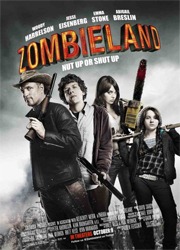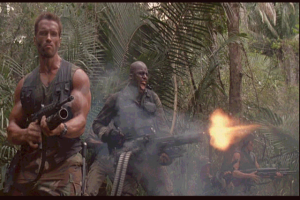Recently, I watched a movie called ZOMBIELAND staring Woody Harrelson and Abigail Breslin (Little Miss Sunshine). It was a fun movie with lots of laughs and clever moments like the “Zombie kill of the week” involving a grand piano, and a guest appearance by Bill Murray who played himself. Sadly, he was accidently shot and killed. Those things tend to happen in zombie movies. I’m not a zombie fan, but I enjoyed this movie.
 I think it takes a lot of guts to write about zombies or vampires or werewolves. That’s because I consider those topics to be “box” stories. I feel that the moment you write the first word of a zombie story, you have placed yourself in a box. It’s hard to make a zombie more disgusting; everyone on the planet already knows how disgusting they are. Just like it’s a challenge to make a vampire more vile or a werewolf more dangerous. It’s sort of like writing about Jeffery Dahmer’s hearty appetite. You’re making the tough job of writing even tougher. The secret to great zombie stories is not the zombies, it’s the characters that must struggle to survive. Characters make the story. After all, George Lucas could have easily changed Luke Skywalker’s name to Frodo Baggins, set the story in a place called The Shire, changed the name from Star Wars to . . .well, you get the point. It would have been the same basic story because what matters are the characters, not the setting.
I think it takes a lot of guts to write about zombies or vampires or werewolves. That’s because I consider those topics to be “box” stories. I feel that the moment you write the first word of a zombie story, you have placed yourself in a box. It’s hard to make a zombie more disgusting; everyone on the planet already knows how disgusting they are. Just like it’s a challenge to make a vampire more vile or a werewolf more dangerous. It’s sort of like writing about Jeffery Dahmer’s hearty appetite. You’re making the tough job of writing even tougher. The secret to great zombie stories is not the zombies, it’s the characters that must struggle to survive. Characters make the story. After all, George Lucas could have easily changed Luke Skywalker’s name to Frodo Baggins, set the story in a place called The Shire, changed the name from Star Wars to . . .well, you get the point. It would have been the same basic story because what matters are the characters, not the setting.
We don’t get to pick which one-page submissions we critique, our fearless founder Kathryn Lilley hands them out to each of us. So I may not be the best choice to comment on a zombie story simply because I don’t read them. But I can comment on the writing. And my comments follow today’s one-page anonymous submission called RUE.
They say that a person’s first memory shapes its being.
My first memory was of pain. Incredible, unending pain, beyond any possibility of relief. I tried to scream. There was no breath in my lungs to scream with, and besides, there were…things. In my throat, and in my nose. I couldn’t even think, the pain was so bad.
After a moment, or it might have been an eternity, the pain pulled back some, and I was able to grip the things – tubes, like the ones my grandmother had had in her mouth near the end (grandmother? I couldn’t remember the woman’s face, only that she had died in a hospital) and pull them out. That hurt too.
Once I was sitting upright and reasonably awake, I became aware of the hunger. It was terrible, a deep painful gnawing in my gut. I was starving.
“Hello? Is anyone there?” I called. My voice echoed out into the hospital, but there was no other sound. And there it was, the thing that had been bothering me: it was too quiet. I had been in hospitals before, and they were noisy places, polluted with the sounds of blood pressure machines and the many, many other things humans use to keep death at bay for just a little while longer.
So I got out of the bed. My feet hurt, but no more than anything else, and they would carry me. There was nobody in the hospital – or at least, nobody I could find. I kept thinking I could hear voices, just around the next corner, or the next…
I found the cafeteria, though, and helped myself. Eating with my hands like a savage I emptied three huge serving bowls of lasagne that had seen better days. It didn’t really help much. I was still starving.
I went on. It was about then that the first zombie found me. It had been a doctor once, I think. It wasn’t anymore. It was just a mindless…thing, and it was hungry. My first impression of it was confused. Lab-coat, once white, now a sort of greyish brown. Grey skin. Hair falling out in clumps, and eyes that saw nothing. And over it all a deep black chasm of hunger, laced with hopeless screams. That’s one thing the living were fortunate not to know. The walking dead are still aware. Trapped, helpless in their decaying bodies, the soul of each zombie screams endlessly for some kind of release, bound about by the endless consuming hunger of the undead.
This is a pretty good beginning although I was a bit thrown by the first line indicating this was “My first memory”. I immediately pictured an infant with a phenomenal awareness. But reading on made it clear that it was an adult or young adult. The sex is unknown.
There’s conflict right off the bat with the medical impediments and the unnerving isolation in what should be a busy place. I think it’s over-written and just needs a good, swift kick with a red pen. But overall, I’m going to assume a zombie fan would keep reading to find out if this person makes it out of the hospital. In reality, isn’t that the plot of all zombie stories?
One advantage to writing a zombie story is that the basic conflict is built-in and comes with the territory. We know there’s going to be danger around every corner and the protagonist will probably get few moments to take a breather. So overall, I’ll give this submission a B-. Get out the editing pen, clean it up, delete all the unnecessary words, and the author will have a good start here.
What do you zombie and non-zombie fans think? Would you keep reading?
Download FRESH KILLS, Tales from the Kill Zone to your Kindle or PC today.
![[image4.png]](https://killzoneblog.com/wp-content/uploads/2010/07/image4.png) It’s time for another Open Tuesday while our blogmate, Kathryn Lilley, is on medical hiatus. Bring us your questions, comments and discussions. If you have a question about writing, publishing or any other related topic, ask away in our comments section. We’ll do our best to get you an answer.
It’s time for another Open Tuesday while our blogmate, Kathryn Lilley, is on medical hiatus. Bring us your questions, comments and discussions. If you have a question about writing, publishing or any other related topic, ask away in our comments section. We’ll do our best to get you an answer.




